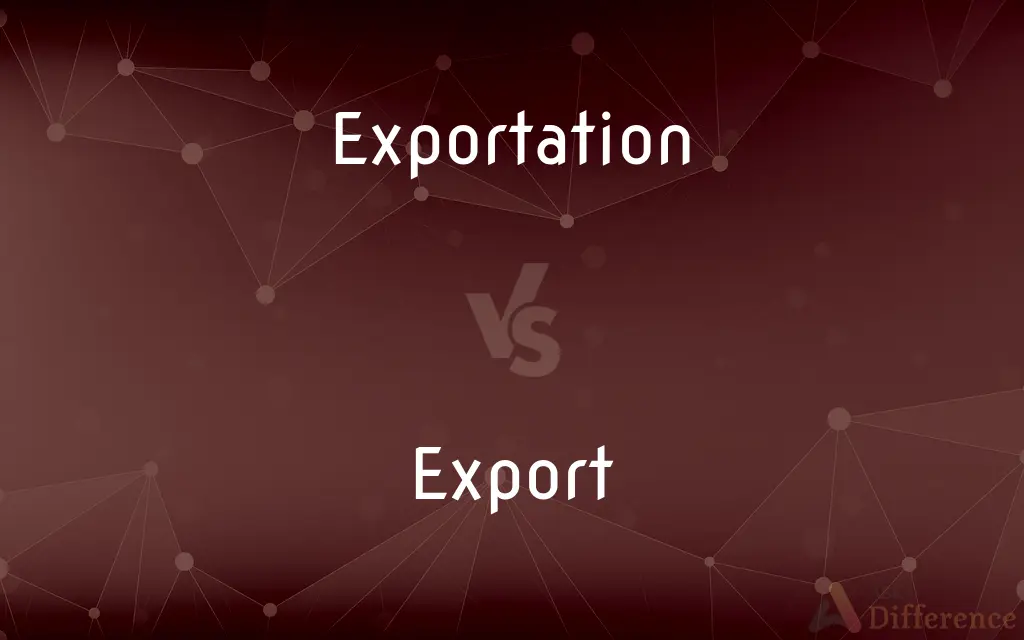Exportation vs. Export — What's the Difference?
Edited by Tayyaba Rehman — By Urooj Arif — Updated on April 4, 2024
Exportation is the process or act of shipping goods or services out of a country, while export refers to the goods or services themselves that are sent to another country for sale.

Difference Between Exportation and Export
Table of Contents
ADVERTISEMENT
Key Differences
Exportation encompasses the entire process involved in sending goods or services from one country to another, including logistics, compliance with regulations, and the final act of shipping. It's a term that highlights the procedural aspects, such as the preparation, legal requirements, and transportation mechanisms used to export products. On the other hand, export specifically denotes the goods or services that are transferred out of a country to a foreign market. This term focuses more on the items being traded rather than the method or process of trading them.
In the context of international trade, exportation involves a series of steps that exporters must follow to ensure their products reach their destination legally and safely. This includes obtaining necessary export licenses, paying any relevant tariffs, and adhering to both the exporting and importing countries' regulations. Exports, however, are the tangible or intangible goods shipped abroad, ranging from agricultural products, machinery, and technology to services like tourism, education, and financial services.
While exportation as a process is essential for understanding how international trade operates, including the economic, legal, and logistical challenges faced, the term export is crucial in economic analyses to denote the volume or value of goods and services a country sells overseas. It's a key indicator of a country's economic health and its position in global trade networks.
Both exportation and exports are integral to the global economy, driving economic growth, creating jobs, and fostering international cooperation. The distinction between the two terms highlights the difference between the process and the products of international trade, each playing a unique role in the broader context of global commerce.
Comparison Chart
Definition
The process or act of shipping goods or services out of a country.
The goods or services themselves that are sent to another country for sale.
ADVERTISEMENT
Focus
Process and logistics of sending goods abroad.
The actual goods or services traded internationally.
Involved Aspects
Legal compliance, transportation, documentation.
Products, market value, trade statistics.
Key Concerns
Efficiency, compliance, and cost-effectiveness of the process.
Market trends, economic impact, and trade opportunities.
Professionals Involved
Trade lawyers, logistics managers, customs brokers.
Businesses, economists, market analysts.
Compare with Definitions
Exportation
Involves adherence to international trade laws and regulations.
Proper exportation procedures ensure that products meet the destination country's standards and legal requirements.
Export
Cause to spread in another part of the world;
The Russians exported Marxism to Africa
Exportation
The act or process of sending goods or services to another country for sale.
The company specializes in the exportation of luxury cars to European markets.
Export
Can be tangible goods like cars and agricultural products or services like banking and tourism.
Software development has become a major export in the tech industry.
Exportation
Requires logistical planning and coordination.
Successful exportation relies on efficient shipping routes and reliable transportation methods.
Export
Goods or services sent to another country for sale.
Coffee is one of the main exports of Colombia.
Exportation
Aimed at expanding a country's reach in the global market.
The government launched a new initiative to boost the exportation of homegrown technology solutions.
Export
A key indicator of a country's economic performance.
Analysts use the value of exports to assess the economic growth rate of nations.
Exportation
The act of exporting.
Export
An essential component of international trade and economic health.
The increase in exports led to a significant improvement in the country's trade balance.
Exportation
Something exported; an export.
Export
An export in international trade is a good produced in one country that is sold into another country or a service provided in one country for a national or resident of another country. The seller of such goods or the service provider is an exporter; the foreign buyer is an importer.
Exportation
The act of exporting; the act of conveying or sending commodities abroad or to another country, in the course of commerce.
Export
To send or transport (a commodity, for example) abroad, especially for trade or sale.
Exportation
The commodity exported; an export.
Export
To cause the spread of (an idea, for example) in another part of the world; transmit.
Exportation
The act of carrying something outside.
Export
To send (data) from one program to another
"You'll need to export your spreadsheet file into a desktop publishing program" (Jon Pepper).
Exportation
(logic) Either the logical law , or the rule of replacement .
Export
To use an application to store (data) on disk, usually for use by another program.
Exportation
The act of exporting; the act of conveying or sending commodities abroad or to another country, in the course of commerce.
Export
To send or transport abroad merchandise, especially for sale or trade.
Exportation
Commodity exported; an export.
Export
Exportation.
Exportation
The act of carrying out.
Export
Of or relating to exportation or exports.
Exportation
Commodities (goods or services) sold to a foreign country
Export
(countable) Something that is exported.
Oil is the main export of Saudi Arabia.
Exportation
The commercial activity of selling and shipping goods to a foreign country
Export
(uncountable) The act of exporting.
The export of fish is forbidden in this country.
Export
(transitive) To carry away.
Export
(transitive) To sell (goods) to a foreign country.
Japan exports electronic goods throughout the world.
Export
(transitive) To cause to spread in another part of the world.
Export
To send (data) from one program to another.
Export
(transitive) To put up (a child) for international adoption.
Export
To carry away; to remove.
[They] export honor from a man, and make him a return in envy.
Export
To carry or send abroad, or out of a country, especially to foreign countries, as merchandise or commodities in the way of commerce; - the opposite of import; as, to export grain, cotton, cattle, goods, etc.
Export
The act of exporting; exportation; as, to prohibit the export of wheat or tobacco.
Export
That which is exported; a commodity conveyed from one country or State to another in the way of traffic; - used chiefly in the plural, exports.
The ordinary course of exchange . . . between two places must likewise be an indication of the ordinary course of their exports and imports.
Export
Commodities (goods or services) sold to a foreign country
Export
Sell or transfer abroad;
We export less than we import and have a negative trade balance
Common Curiosities
What role do governments play in exportation?
Governments establish trade agreements, provide export assistance and incentives, and ensure that businesses comply with international trade laws to facilitate exportation.
What are the challenges in the exportation process?
Challenges include navigating complex legal and regulatory frameworks, managing logistics and transportation, and adapting to foreign market demands and standards.
How do exports affect a country's economy?
Exports bring in foreign exchange, improve trade balances, and stimulate economic development by expanding markets for domestic producers.
Can services be considered exports?
Yes, services like education, tourism, financial consulting, and digital products can be exported, contributing significantly to a country's economic performance.
How do tariffs impact the exportation process?
Tariffs, as taxes on imported goods, can make exporting products more expensive for the receiving country, potentially reducing demand for those goods.
What distinguishes direct exports from indirect exports?
Direct exports involve a company selling its products directly to a buyer in another country, whereas indirect exports use intermediaries or third parties to sell products abroad.
How do environmental regulations affect exports?
Environmental regulations can impact exports by requiring businesses to adhere to specific standards in their production processes, potentially increasing costs but also opening up markets that demand environmentally friendly products.
What is the role of a customs broker in exportation?
A customs broker facilitates the export process by ensuring that all legal and regulatory requirements are met for shipping goods across international borders, helping to avoid delays or penalties.
Can digital products be exported?
Yes, digital products like software, e-books, and online courses can be exported, often requiring less logistical effort but needing to comply with intellectual property laws and regulations in the target market.
Why is exportation important for a country?
Exportation is crucial as it opens up new markets for a country's goods and services, leading to economic growth, job creation, and increased revenue.
How do exchange rates affect exports?
Exchange rates influence the cost competitiveness of exports; when a country's currency is weaker, its exports become cheaper and more attractive to foreign buyers.
What are the benefits of exporting for small businesses?
Exporting allows small businesses to diversify their market, reduce dependence on domestic sales, and increase potential revenue by reaching new customers worldwide.
How do free trade agreements influence exportation?
Free trade agreements can facilitate exportation by reducing or eliminating tariffs and import quotas between member countries, making it easier and more cost-effective for businesses to export to these markets.
What strategies can companies use to find new export markets?
Companies can use market research, trade shows, and government export assistance programs to identify and evaluate new markets for their products or services.
How do currency fluctuations affect the profitability of exporting?
Currency fluctuations can affect export profitability; if the exporter's currency strengthens, their goods become more expensive for foreign buyers, potentially reducing demand.
What is an Export Credit Agency (ECA)?
An ECA is a government or quasi-governmental institution that provides loans, insurance, and guarantees to support domestic companies in exporting their goods and services.
Share Your Discovery

Previous Comparison
Cold vs. Cooler
Next Comparison
Law vs. RightAuthor Spotlight
Written by
Urooj ArifUrooj is a skilled content writer at Ask Difference, known for her exceptional ability to simplify complex topics into engaging and informative content. With a passion for research and a flair for clear, concise writing, she consistently delivers articles that resonate with our diverse audience.
Edited by
Tayyaba RehmanTayyaba Rehman is a distinguished writer, currently serving as a primary contributor to askdifference.com. As a researcher in semantics and etymology, Tayyaba's passion for the complexity of languages and their distinctions has found a perfect home on the platform. Tayyaba delves into the intricacies of language, distinguishing between commonly confused words and phrases, thereby providing clarity for readers worldwide.















































